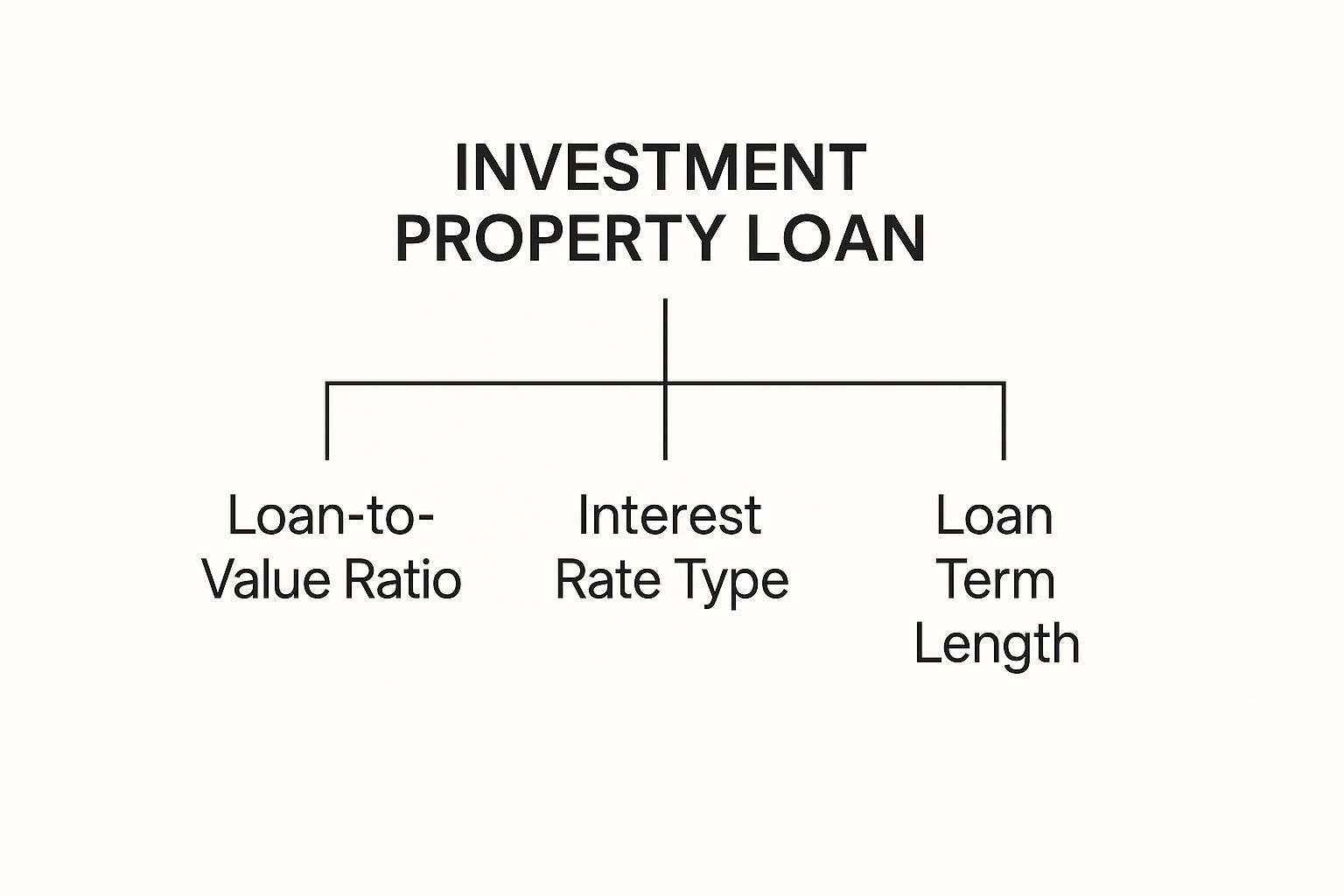Secure Your Investment Property Loan Today | Expert Guidance
September 28, 2025
Learn how to get an investment property loan easily. Discover tips, requirements, and strategies to fund your next rental property successfully.

An investment property loan is, at its core, a business loan. It’s the specific type of financing you need to buy real estate that you plan to rent out or flip for a profit, not to live in yourself. Unlike the mortgage on your own home, lenders view this as a business transaction. This means they're going to look at it with a much more critical eye, and that usually translates to needing a bigger down payment and a stronger credit score right out of the gate.
Think of it this way: you're not just buying a house; you're starting a real estate enterprise.
Understanding The Investment Property Loan

When you buy a home to live in, lenders see a future homeowner. But when you buy a rental property, they see a budding entrepreneur. The property itself becomes your primary asset, and the monthly rent is your revenue stream. This simple change in perspective is why getting an investment property loan feels like a completely different process.
From a lender’s point of view, these loans carry more risk. If someone hits a financial rough patch, which mortgage are they going to pay first? The one for the roof over their own head, of course. The rental property's payment will almost always come second. Lenders know this, and they pass that risk on to you through tougher qualification rules. To get a better feel for where these loans fit in the broader picture, it’s helpful to understand the various types of mortgage loans on the market.
It's All About the Numbers
When buying an investment property, you have to take off your "homeowner" hat and put on your "business owner" hat. Leave the emotions at the door. This isn't about finding a place with a cozy fireplace; it’s a strategic, data-driven decision focused squarely on the bottom line.
Your loan application is less of a personal plea and more of a business plan you’re pitching to potential investors—in this case, the bank. They'll pour over your finances and the property's income potential, so you need to prove two things:
- You're a safe bet. You have the financial stability to cover the mortgage, even with unexpected vacancies.
- The property is a good investment. It has a clear path to generating positive cash flow from rent or appreciating enough for a profitable resale.
An investment property loan isn’t about finding a place to call home. It’s about acquiring an asset that puts money in your pocket. The whole process is built around whether the property can stand on its own as a successful business.
Investment Loan Vs. Primary Mortgage at a Glance
So, what are the concrete differences you'll face? While we’ll dig deeper into the specifics later, let’s get a high-level view. To put it simply, getting financing for a rental property requires more cash upfront and a cleaner financial track record.
This table breaks down the key distinctions at a glance:
FeatureInvestment Property LoanPrimary Residence MortgageMain PurposeTo generate income (rent or resale)To live in the propertyLender's RiskHigherLowerDown PaymentTypically 20-25% or moreAs low as 3-5%Credit ScoreUsually 700+ requiredOften possible with 620+Interest RatesGenerally higherGenerally lowerCash Reserves6+ months of payments often requiredMay not be required
These stricter requirements aren't meant to discourage you. They're safeguards. Lenders need to be confident that their capital is secure and that you're a serious, well-prepared investor. If you understand this mindset from the very beginning, you’ll be much better positioned for success.
Finding the Right Loan for Your Strategy
Choosing an investment property loan isn't a one-size-fits-all decision. Think of it less like picking a product off a shelf and more like choosing the right gear for a specific expedition. The loan you need must perfectly align with your real estate investment strategy.
Are you playing the long game for steady rental income? Or are you looking for a quick fix-and-flip profit? Maybe you're planning to scale up to a large portfolio. Each of these goals requires a different financial tool. You wouldn't take a sports car off-roading, and you shouldn't use a long-term mortgage for a short-term flip. Let's break down the main loan types to help you match your financing to your vision.
Conventional Loans: The Workhorse of Investing
For most real estate investors, especially when you're just getting your feet wet, the conventional loan is the go-to option. These are the tried-and-true mortgages from private lenders like banks and credit unions, without any government insurance. Their popularity comes from offering competitive interest rates and being flexible enough for various investment properties, from single-family homes to small apartment buildings.
A conventional loan is your best bet for buying a stable, rent-ready property. Be prepared, though. Lenders will want to see a hefty down payment, usually in the 20-25% range, and a strong credit score—think 700 or higher. In return, you secure a reliable, long-term financing solution, often with a fixed interest rate. This makes it much easier to project your monthly cash flow for years to come.
Lenders see a large down payment as having "skin in the game." When you put down 25%, you're not just lowering their risk; you're showing them you’re confident and committed to the property. This often convinces them to give you better loan terms.
Government-Backed Loans: The Ultimate House-Hacking Tool
While loans like FHA and VA are designed for people who plan to live in the home they buy, a little-known secret makes them incredibly powerful for aspiring investors. You can use these loans to buy a property with up to four units, live in one yourself, and rent out the others. This is the essence of the popular strategy known as "house hacking."
This brilliant approach lets you become a landlord with a shockingly low down payment—sometimes just 3.5% for an FHA loan. And for veterans and active service members, a VA-guaranteed loan is even better. Curious? You can learn more about getting started by exploring your options for a VA loan. The rent you collect from your tenants can help pay down your mortgage, potentially letting you live for free while you build equity in a valuable asset.
Portfolio and Hard Money Loans: For Scaling and Flipping
Once you have a few properties under your belt, you might find that conventional loans start to hold you back. This is where portfolio loans come in. These are special loans from lenders who keep them "in-house" instead of selling them on the secondary market. This gives them the freedom to be more flexible, often allowing you to finance several properties under one blanket loan—perfect for investors ready to scale their business.
On the flip side, if your game is fixing and flipping houses, speed is everything. A hard money loan acts as a short-term "bridge" funded by private investors. Here, the approval hinges more on the property's potential after you fix it up (the After-Repair Value or ARV) than on your personal credit history. The interest rates are higher, yes, but these loans can be funded in a matter of days, not weeks. This speed allows you to jump on hot deals that slower, traditional financing would force you to miss. To build a solid strategy, it's smart to first get a handle on using rental property value estimators to forecast a property's potential profitability.
This graphic really simplifies the core elements that make up any investment property loan.

As you can see, every loan is a balancing act between these three pillars. Understanding how they work together is the key to structuring a deal that aligns with your financial goals and investment timeline.
How to Qualify for Your First Investor Loan
Getting a loan for an investment property isn't quite like getting a mortgage for the home you live in. Think of it more like pitching a business plan. You're not just asking for money to buy a house; you're asking a lender to partner with you on a financial venture. They're going to look at your application through a risk-management lens, so your job is to show them you’re stable, prepared, and have a clear strategy for making a profit.
Your financial profile is your resume for this deal. Every single detail, from your credit score to your savings balance, tells a story about how reliable you’ll be as a borrower. The requirements are tougher, sure, but they’re not there to block you. They’re simply safeguards for the lender to make sure their capital is in good hands.
The Down Payment: Your Foundation of Trust
For most new investors, the biggest initial hurdle is the down payment. Forget the 3-5% you might see for a primary residence. Investment properties play in a different league.
Lenders are almost always going to ask for 20% to 25% of the purchase price. So, for a $300,000 property, you’ll need to have $60,000 to $75,000 in cash ready to deploy. This isn't just an arbitrary number; it serves two crucial functions:
- It lowers their risk. A bigger down payment means a smaller loan, which naturally reduces the lender's exposure if things go south.
- It proves you’re serious. When you put a significant chunk of your own cash on the line—what we call having "skin in the game"—it shows you're fully committed to making the investment work.
Putting more money down often translates into better loan terms and can help you avoid private mortgage insurance (PMI), which saves you money every single month.
Your Credit Score and DTI: The Twin Pillars of Qualification
After the down payment, lenders immediately zoom in on two metrics that give them a snapshot of your financial health: your credit score and your debt-to-income (DTI) ratio. These are the non-negotiables on your financial resume.
A strong credit score is absolutely essential. Most lenders want to see a FICO score of at least 700, and the best interest rates are usually reserved for those with a score of 720 or higher. A great score tells them you have a proven track record of managing debt responsibly, making you a much safer bet.
Lenders aren't just looking at a single number; they're assessing your entire credit history. A score above 720 tells them you're not just capable of managing debt—you're excellent at it. This confidence can translate directly into a lower interest rate, saving you tens of thousands over the life of the loan.
Your Debt-to-Income (DTI) ratio is just as critical. This number is simple: it’s your total monthly debt payments (your current mortgage, car loans, credit cards, etc.) divided by your gross monthly income. For an investment loan, lenders typically want your DTI to be below 45%. This assures them that you can comfortably handle your existing bills plus the new mortgage payment, without being stretched too thin.
Cash Reserves: Your Financial Safety Net
The final piece of the puzzle is your cash reserves. Lenders need to see that you have a financial cushion to handle the unexpected. What happens if the property sits vacant for a few months, or if a furnace dies in the middle of winter? They don’t want a leaky roof to be the reason you miss a payment.
The standard here is to have at least six months’ worth of PITI (Principal, Interest, Taxes, and Insurance) payments for the new property sitting in a liquid account. If the total monthly payment is $2,000, you'll need to show at least $12,000 in the bank—on top of your down payment and closing costs.
For some investors, tapping into their existing home equity is a smart way to meet these reserve requirements. To see if this could be an option for you, check out our guide on what is a cash-out refinance. This financial buffer proves you have a safety net, making you a much more attractive and secure applicant in the eyes of any lender.
Making Sense of Interest Rates and Market Conditions

As you start shopping for an investment property loan, one of the first things you'll discover is that the interest rate is higher than what you'd get for your own home. Don't be surprised by this; it’s a standard business practice for lenders. From their perspective, a property you don't live in carries a higher risk of default.
Just think about it. If you hit a financial rough patch, which mortgage are you going to pay first? The one for the roof over your family's head, of course. Your rental property's payment will almost always come second. Lenders account for this added risk by building a premium into the loan, typically making your rate 0.50% to 0.75% higher than a standard mortgage. It's simply their insurance policy against the chance you might default.
The Risk Premium Explained
This "risk premium" isn't a reflection on you personally. It’s just a core principle of real estate investment lending. A slightly higher rate compensates the lender for backing a loan that, statistically speaking, is more likely to face trouble. It's the cost of doing business and the trade-off for the opportunity to build wealth and generate rental income.
Once you understand this, you can treat that higher rate as a predictable business expense, just like property insurance or taxes. It’s a number you can plug right into your spreadsheets to make sure the deal works and your investment will be profitable from day one. In some ways, a detailed property review can help ease a lender's concerns, much like how understanding home inspection requirements for VA loans helps a veteran prepare for that specific process.
How Economic Conditions Shape Your Loan
Beyond your personal finances, much larger economic forces are at play, heavily influencing the interest rate you'll get. Your loan doesn't exist in a bubble—it's tied directly to the health of the entire economy.
Things like Federal Reserve policy, inflation, and the performance of U.S. Treasury bonds create the overall "climate" in the lending world. When the Fed raises its key rate to cool down inflation, for example, the cost of borrowing goes up for everyone, and real estate investors are no exception.
"Understanding the big-picture economy is like knowing the weather forecast before you set sail. It doesn't change your destination, but it helps you prepare for the journey and choose the best time to leave the harbor."
This awareness is a strategic tool. By keeping an eye on economic trends, you can get a feel for whether rates are likely to rise or fall, helping you time your application to lock in the best possible terms.
Looking Ahead at Market Trends
Staying on top of market forecasts can give you a real edge. For instance, recent predictions point toward a market that, while dynamic, is beginning to stabilize for investors.
Projections for 2025 suggest that average interest rates on investment property loans might sit around 5.9%, possibly dipping to 5.7% by the end of the year. At the same time, the total dollar amount of new mortgages is expected to climb to about $2.155 trillion. This points to a resilient market where demand remains strong, even with higher borrowing costs. For a deeper dive, you can explore a full analysis of 2025 real estate interest rate predictions.
This data tells a compelling story. Even though the cost to borrow is still up, the projected jump in lending activity proves that savvy investors are still out there finding and financing great deals. Knowing this allows you to approach the market with a clear-eyed strategy, not with hesitation. You can move forward and negotiate from a position of strength, fully aware of the current landscape and what might be coming next.
Proven Strategies to Secure the Best Loan Terms
Getting approved for an investment property loan is one thing. Getting a great loan is another game entirely. Just meeting the minimum requirements makes you a passable applicant, but we're not aiming for passable. We're aiming for profitable.
To secure the best possible terms—a lower rate, better fees, more flexibility—you have to think like a strategist, not just an applicant. You're not just filling out forms; you're building a compelling case for why a lender should want you as a partner. A few smart moves here can literally save you tens of thousands of dollars over the life of your loan.
Make a Larger Down Payment Your Power Play
While you can often get by with a 20-25% down payment, bringing more cash to the table is your single most powerful negotiating tool. It's simple when you look at it from the lender's point of view: a bigger down payment drastically cuts their risk by lowering the loan-to-value (LTV) ratio.
When you offer to put down 30% or more, you’re sending a powerful signal. You’re not just a borrower; you're a serious partner with significant "skin in the game." That confidence and financial strength almost always persuades a lender to give you their most competitive interest rates.
Shop Your Loan Application Aggressively
This is non-negotiable for any serious investor: never, ever take the first loan offer you get. Finding the best loan is a numbers game, and your job is to create a little friendly competition among lenders.
Cast a wide net. You need to apply with a diverse group of institutions to see who really wants your business. Make sure your list includes:
- Big National Banks: They have established programs and are a good baseline, though they can sometimes be rigid.
- Local Credit Unions: These smaller players can be hidden gems, often offering more personal service and fantastic rates, especially if you're already a member.
- Mortgage Brokers: A great broker is worth their weight in gold. They have relationships with dozens of lenders and can uncover niche loan products you'd never find on your own.
Get at least three to five different loan estimates. This gives you incredible leverage. You can then walk back to your preferred lender with a better offer in hand and ask them to match it. It's the easiest way to make sure you aren't leaving money on the table.
Build Relationships with Portfolio Lenders
Most lenders bundle up their loans and sell them off to giants like Fannie Mae and Freddie Mac. But some, typically smaller community banks and credit unions, keep their loans "in-house." These are portfolio lenders, and they can be an investor's secret weapon.
Because they aren't tied to the strict, one-size-fits-all rules of the secondary market, portfolio lenders have the freedom to be more creative. They're often your best bet if you have a unique property or a more complex financial picture. Building a real, first-name-basis relationship with a loan officer at one of these banks can pay off for years to come as you grow your real estate business.
Use Market Intelligence as Leverage
Finally, don't walk into a negotiation blind. You need to come armed with data. Knowing the current market conditions shows the lender you’ve done your homework and strengthens your position immensely. For instance, right now, the tide is turning in our favor.
An improving lending environment is on the horizon. A recent Deloitte survey found that 68% of commercial real estate leaders expect financing to get cheaper in 2025, and 69% believe capital will be easier to find. That's a huge shift from last year and shows that lenders are feeling more optimistic, especially about high-demand housing. You can see the data yourself in the full commercial real estate outlook on Deloitte's website.
When you casually mention these trends, you're no longer just another applicant asking for money. You're a well-informed investor who understands the market—and that’s exactly the kind of person every lender wants to work with.
Common Questions About Investment Property Loans

Diving into real estate financing always stirs up a lot of questions. As you get closer to locking in a loan for your first (or next) investment property, you need clear, straightforward answers to move forward with confidence.
Let's walk through some of the most common questions I hear from investors. Think of this as your final Q&A session before you head to the closing table, ensuring your investment is built on a rock-solid financial footing from the get-go.
Can I Use an FHA or VA Loan for an Investment Property?
This is a classic question with a clever answer. While FHA and VA loans are designed for primary homes, there’s a fantastic strategy that lets you use them for investing. It’s called “house hacking.”
The approach is simple: you buy a multi-unit property (up to four units), live in one of the units yourself, and rent out the others. Because you’re living on-site, you satisfy the owner-occupancy rule. This is one of the best ways to get started, as it lets you jump into real estate investing with a much smaller down payment than a traditional investment loan would ever allow.
How Much Cash Do I Really Need to Secure My Loan?
It’s about more than just the down payment. While you should plan for a down payment of 20-25%, lenders also need to see that you have a financial cushion. These are your cash reserves, and they are absolutely critical for getting approved.
As a rule of thumb, lenders want to see at least six months of PITI (that’s Principal, Interest, Taxes, and Insurance) payments for the investment property sitting in your bank account. This proves you can weather a few months of vacancy or handle an unexpected major repair without missing a mortgage payment.
So, if your new property has a monthly PITI payment of $2,000, you'll need to show you have $12,000 in a liquid account—on top of your down payment and closing costs.
Does Potential Rental Income Help Me Qualify?
Absolutely, and this is a game-changer. Lenders don't just look at your W-2 or business income; they will factor in the property's own earning power.
Most lenders will count about 75% of the property’s projected gross rental income and add it to your qualifying income. Why not 100%? They build in a buffer for vacancies and maintenance. This extra income can significantly boost your debt-to-income (DTI) ratio, often making the difference between a denial and an approval.
To prove this income, you'll need a signed lease if the property already has tenants. If it's vacant, the lender will order an official rent schedule (Form 1007) from the appraiser to estimate the fair market rent.
Figuring out the ins and outs of an investment property loan is much easier when you have an expert in your corner. At Tiger Loans Inc, we live and breathe this stuff, and we specialize in matching investors with the right financing for their real estate ambitions. Ready to start building wealth? Explore your options with us today at https://www.tigerloans.com.

Alex Chen

Alex Chen













Get in touch with a loan officer
Our dedicated loan officers are here to guide you through every step of the home buying process, ensuring you find the perfect mortgage solution tailored to your needs.
Options
Exercising Options
Selling
Quarterly estimates
Loans
New home

Stay always updated on insightful articles and guides.
Every Monday, you'll get an article or a guide that will help you be more present, focused and productive in your work and personal life.


.png)
.png)
.png)
.png)
.png)
.png)
.png)
.png)
.png)
.png)
.png)
.png)
.png)
.png)
.png)
.png)
.png)
.png)
.png)
.png)
.png)
.png)
.png)
.png)